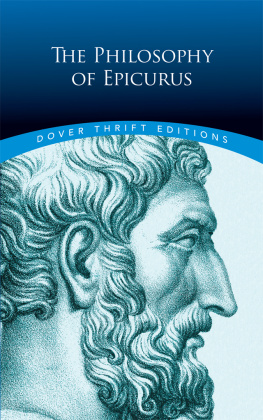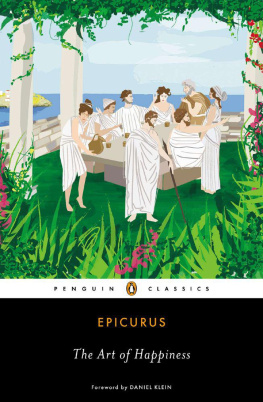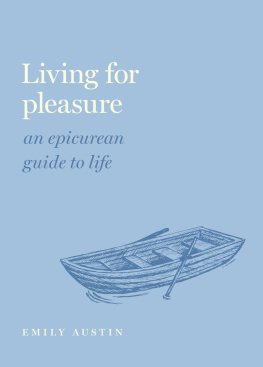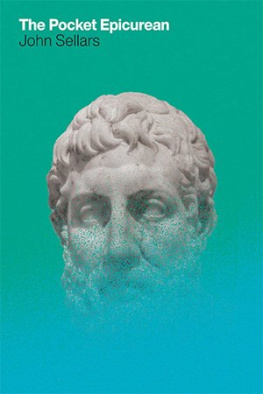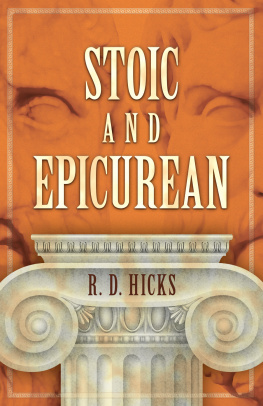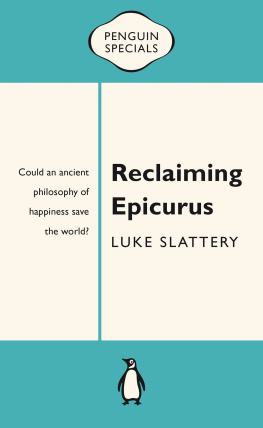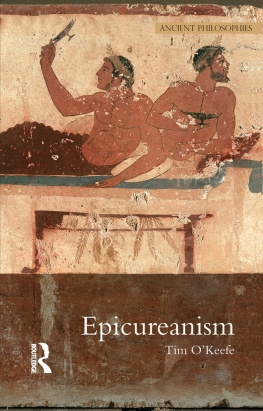CONTENTS
LETTERS AND SAYINGS OF EPICURUS
EPICURUS
TRANSLATION, INTRODUCTION, AND NOTES BY ODYSSEUS MAKRIDIS

INTRODUCTION
THROUGHOUT THE AGES EPICURUS (341-271 BCE) HAS BEEN BOTH idealized and anathematized. As an atheist materialist philosopher he was an offense to religious thinkers. Many of his influential admirers, like Thomas Hobbes and Thomas Jefferson, had to keep their Epicurean leanings a secret. On the other hand, the philosopher-physicist Isaac Newton was candid enough to assert openly that he was reviving the tenets of the Epicurean philosophy when he embarked on his world-transforming project. But Epicurus significance transcends even his astounding historical influence because the subjects he reflected on are of enduring significance: What is the purpose of life? What is the nature of reality? How did this world come into existence? Is it going to last forever? How many worlds exist? What is the appropriate method for the investigation of natural phenomena? What are the proper criteria for establishing whether a claim is true or false? How should we live our lives? Should we fear death?
EPICURUS LIFE AND SIGNIFICANCE AS A THINKER
Epicurus was born, probably in Athens, in 341 BCE. The city was a pale reflection of its resplendent past. The apogee of Sophocles and Platos golden age was now a pallid memory. The bustling cultural activity of Athenian life had waned irrevocably. Nevertheless, philosophy was by no means moribund. A remarkable trend was being set, which was destined later to continue and endure even under the auspices of the Roman Empire: The allure of philosophy would prove irresistible for many vulgar newcomers. When we study other historical periods and cultures we find that the upstart is more likely to be attracted to conspicuous consumption of the garish sort. Remarkably, in the days of Epicurus and, even more so in Roman times, the ability to afford philosophic training was considered one of the most irresistible displays of high status. This almost serendipitous phenomenon ensured that philosophic activity would continue unabated for many centuries and would register a remarkable influence on many nascent systems, including Christianity itself. But there is a catch.
The problems inherited from the generations of Plato and Aristotle were alive and well. Debates were animated and philosophic enthusiasm did not pass from the earth. On the other hand, however, in the centuries that followed, the traditional problems of philosophy were often discussed in an unoriginal, reiterative fashion and, often, simply for the sake of creating impressions or with a view to producing dry encyclopedic compilations. This is not unique to this period of courseand it might be eerily similar to periods with which we are more familiar. An additional phenomenon was the exponential and rapid growth of mystical preoccupations. One could argue that Plato had a pronouncedly mystic side to his thinking; but, while Platos mysticism is a metaphysically transcendental position, the new mysticism was a crude and frightened superstition. Epicurus significance becomes more evident when we mention that the atomist philosopher saw himself as the enemy of superstition and champion ofwhat we would call todaycommonsense rationalist empiricism.
By this time, the democratic experiment of the Athenian polis had all but been forgotten. (Of course, many celebrated ancient philosophers, including Plato himself, were harshly critical of Athenian democracy.) Unmoored from the salutary influence of civic life and reduced to passive and harassed dependency, the common folks became enthusiastic recipients of paranormal fables and superstitious tales. The popular interest in astrological trumpery seems to have been insatiable. It also seems to have been the case that the endless supply of tabloid-like tales about punishing gods actually contributed to an exacerbation of the maddening fears that had made such stories popular in the first place. This must have been a melancholy era indeed. If we keep this in mind, we will not be surprised by Epicurus insistence that the greatest ethical value in the universeand, hence, the proper goal of a human lifeis peace of mind. (His detractors thought or, at any rate, claimed that Epicurus took pleasure to be the highest moral value, which, of course, placed Epicurus in the infamous clan of hedonists and ensured that the term Epicureanism would obtain unflattering connotations for posterity.)
To return, for a moment, to the dimension of philosophic activity: We should keep in mind that the fragmentation of philosophical speculation into several disciplines is a late phenomenon. Even Newton thought of himself as, primarily, someone who was engaged in philosophy. Physics and, what we call today metaphysics, were one; and ethics was joined with them too. This union was thought to be harmonious and in accordance with the natural order of things. Natural philosophy was driving developments, even though the ethical problemsunderstood to comprise the meaning of life and the proper purposes of human activitywere generally declared to be the most important. Before Epicurus, the atomic theory had been formulated by Leucippus and Democritus; its presumed refutation, however, had behind it the growing and formidable authority of none other than Aristotle himself. Epicurus picked up this ongoing debate; he reinvigorated and made original contributions to the atomist persuasion and derived a full-bodied metaphysics [theory of reality], epistemology [theory of knowledge], and even methodology [akin to todays philosophy of science] from his natural philosophy of Atomism; the whole system was said to point, with impeccable logical consistency, to an aggregate of ethical corollaries and maxims which promised to secure a happyi.e., imperturbable and tranquillife for the followers of the system.
We see, therefore, that Epicurus both undertook to contribute to a philosophical-scientific debate of grave importance and offered to soothe and heal the anguish of his age. He took this to be natural and logically of one piece although a less sympathetic ageand, in his own times, his numerous traducerswould charge that Epicurus was a phony who, under the veneer of prestigious philosophic pretensions, aspired to be a populist guru, self-important master of devoted disciples, and vain founder and propagandizer of a quasi-religious order. But this is not fair to Epicurus. He might have succumbed to vanity and transports of grandeur, but, to his credit, he concentrated unflinchingly on the most difficult problems of philosophy and worked indefatigably to produce and synthesize reasonable answers. As for the populist appeals of his teachings, Epicurus seems to have thought sincerely that he was offering an invaluable service to his contemporaries by turning the light of reason against the obscurantist horrors of popular superstition and a false astrological theology. It is a great tribute to Epicurus that many modern thinkers, including Thomas Hobbes and perhaps Thomas Jefferson, fashioned their own work, at least in part, after Epicurus brave struggle on behalf of enlightening science and against popular superstition.
Epicurus parents, Neocles and Chaerestrata, were impecunious Athenians who joined a mission of economically driven colonists. They settled on the island of Samos, in the East Aegean Archipelago. Epicurus grew up on the island and turned to philosophy at a ripe, young age. According to a legend, Epicurus decided to pursue philosophic studies when he was only fourteen when he became frustrated at his teachers failure to explain an obscure passage in Hesiods Theogony about the primeval chaos. While on Samos, Epicurus studied with the Platonist Pamphilus.


